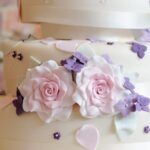Cake decorating is a skill that combines art and culinary expertise to create delicious and visually stunning masterpieces. As a cake decorator, you have the opportunity to turn ordinary cakes into extraordinary works of edible art, making special occasions even more memorable. In this article, we will explore why becoming a cake decorator is a sweet career choice.
The role of a cake decorator goes beyond simply icing and frosting cakes. It involves using various techniques such as piping, sculpting, and painting to transform cakes into beautiful creations. With the rise in demand for custom-made cakes for weddings, birthdays, and other celebrations, the need for skilled cake decorators is on the rise. This career offers endless creativity and the ability to express your artistic talents in a unique way that brings joy to others.
To excel as a cake decorator, certain skills are necessary. Attention to detail is crucial, as every intricate design requires precision. Patience and creativity are also essential traits to bring your visions to life. While formal education in culinary arts or baking can be beneficial, many successful cake decorators have started their careers through self-taught methods or apprenticeships.
In the following sections of this article, we will delve deeper into what it takes to become a cake decorator. We will explore training opportunities and educational programs that can help kickstart your career in cake decorating. Additionally, we will discuss job prospects and earning potential for those entering this field, as well as provide tips on how to secure a coveted cake decorator job through resume hacks and interview preparation strategies.
Whether you have a passion for baking or an eye for design, becoming a cake decorator offers an exciting and rewarding career path. Join us as we uncover the challenges and rewards of being a cake decorator and discover why it truly is a sweet career choice.
The role of a cake decorator
The role of a cake decorator is much more than just making cakes look pretty. Cake decorators are skilled artists who use their creativity and precision to transform plain cakes into delicious works of art. They are responsible for designing, baking, and decorating cakes for various occasions such as birthdays, weddings, and other special events.
In addition to the artistic aspect, cake decorating also requires a high level of attention to detail and technical skills. Cake decorators must have a good understanding of different cake types, flavors, and fillings, as well as a knowledge of various decorating techniques such as icing piping, fondant sculpting, and sugarcraft. They also need to be familiar with different tools and equipment used in cake decorating, including piping bags, stencils, cutters, and molds.
The demand for skilled cake decorators is on the rise due to the growing popularity of customized cakes for special occasions. More people are now looking for unique and personalized cake designs that reflect their individuality or the theme of their event. This has created a niche market for professional cake decorators who can bring these designs to life with their artistic skills.
Why becoming a cake decorator is a sweet career choice
- Creative Expression: Cake decorating allows you to unleash your creativity and turn everyday cakes into edible masterpieces.
- Job Satisfaction: Seeing the joy on people’s faces when they see your beautifully decorated creations can be incredibly rewarding.
- High Demand: The increasing demand for custom-designed cakes ensures plenty of job opportunities in this field.
- Flexibility: As a cake decorator, you can choose to work in a bakery or start your own business from home.
- Potential for Growth: With experience and talent, you can advance to higher positions or even become a sought-after cake artist in the industry.
Overall, being a cake decorator offers both artistic fulfillment and the potential for a successful career. Whether you choose to work in a bakery or launch your own cake decorating business, this profession allows you to turn your passion for baking and artistic flair into a lucrative occupation. With the right combination of skills, training, and creativity, you can carve out a sweet career as a cake decorator.
Necessary skills and qualifications for a cake decorator job
Becoming a cake decorator requires a unique set of skills and qualifications to thrive in this creative and demanding job. If you have a passion for baking and artistry, combined with a meticulous attention to detail, then this career path may be the perfect fit for you. Here are some necessary skills and qualifications that are essential for a cake decorator job:
- Creativity: As a cake decorator, you will need to think outside the box and come up with unique designs, color combinations, and decorative elements. Having a creative mindset will allow you to create stunning and visually appealing cakes that stand out from the crowd.
- Artistic Skills: Cake decorating is an art form, so having a basic understanding of different artistic techniques will be beneficial. Knowledge of color theory, composition, sculpting, and painting can help you create intricate designs on cakes.
- Attention to Detail: Cake decoration requires precision and attention to detail. From smooth icing surfaces to delicate piping work, every element needs to be pristine. Being meticulous will ensure that your cakes are visually appealing and meet the exact specifications of clients.
- Time Management: Cake decorators often face tight deadlines, especially when it comes to custom orders for special occasions like weddings or birthdays. Being able to manage your time efficiently is crucial in order to complete projects on schedule without compromising quality.
- Technical Skills: Basic knowledge of baking techniques such as mixing ingredients, leveling cakes, applying icing smoothly, and using various decorating tools is essential for a cake decorator. Familiarity with specialized equipment like airbrushes or fondant cutters can also be advantageous.
In terms of qualifications, while formal education in culinary arts or baking may not always be required for entry-level positions as a cake decorator, it can provide valuable foundational knowledge in the field. Many aspiring cake decorators choose to complete certificate programs or associate degrees in culinary arts or baking and pastry arts to gain practical experience and learn advanced techniques. Additionally, obtaining certifications from reputable baking associations or organizations can enhance your credibility and boost employment opportunities.
Overall, becoming a skilled cake decorator involves a combination of natural talent, artistic abilities, and practical skills developed through education and hands-on experience. By honing these necessary skills and qualifications, you can carve out a successful career in the world of cake decorating.
Day in the life of a cake decorator
Being a cake decorator is not only about creating beautiful and delicious cakes, but it also involves a lot of hard work and creativity. A day in the life of a cake decorator is filled with various tasks that require attention to detail and precision. Let’s take a behind-the-scenes look at what goes on in the life of a cake decorator.
One of the primary responsibilities of a cake decorator is to discuss design ideas with clients and understand their specific requests. This may involve meeting with clients in person or communicating through phone or email. The cake decorator must have excellent communication skills to ensure that they can interpret the client’s vision accurately.
Once the design has been agreed upon, the cake decorator starts preparing the cake by baking layers, filling them, and crumb coating them with icing. This process requires careful measurements and timing to ensure that each layer is perfectly cooked and leveled. After that, it’s time for the fun part – decorating.
The decoration process involves applying frosting or buttercream to create unique designs, piping intricate patterns, and adding decorative elements such as fondant accents, edible pearls, or flowers. Cake decorators often use various tools like offset spatulas, piping bags, decorating tips, fondant molds, and cutters to achieve their desired result.
A typical day for a cake decorator can vary greatly depending on factors such as customer orders and deadlines. Some days may be filled with several client consultations and designing cakes from scratch, while others may involve fulfilling existing orders by assembling pre-made decorations onto cakes. Regardless of the tasks at hand, one thing is certain – being a cake decorator requires passion for baking and creativity.
| Tasks | Skills Required |
|---|---|
| Discussing design ideas with clients | Communication skills, customer service |
| Baking layers and filling the cake | Precision in measurements, baking skills |
| Crumb coating and icing the cake | Attention to detail, knowledge of icing techniques |
| Creating unique designs with frosting or buttercream | Creativity, decorating skills |
| Piping intricate patterns and adding decorative elements | Piping skills, knowledge of decorating tools |
How to become a cake decorator
Becoming a cake decorator can be an exciting and rewarding career path for those with a passion for creativity and baking. If you have a knack for turning sugar and flour into works of art, here are some steps to help you kickstart your career in cake decorating:
Gain basic baking knowledge
Before diving into the world of cake decorating, it’s important to have a strong foundation in baking. Familiarize yourself with different types of cakes, their flavors, textures, and baking techniques. Learn how to properly measure ingredients, mix batter, and bake cakes to perfection. Taking specialized baking courses or attending culinary school can provide you with the necessary skills and knowledge.
Develop artistic skills
Cake decorating requires artistic abilities, so it’s important to work on improving your skills in this area. Experiment with different mediums such as drawing, painting, or sculpting to enhance your creativity. Practice piping techniques using icing or fondant on cupcakes or cookies to develop precision and control. Take art classes or workshops that focus on color theory, composition, and design principles to further refine your artistic abilities.
Build a portfolio
As you start practicing your cake decorating skills, be sure to document your creations by taking photographs or creating a physical portfolio showcasing your best work. This will not only serve as a visual representation of your abilities but also demonstrate your progression over time. Consider starting an online portfolio or blog where you can showcase your work and attract potential clients.
| Tips for Becoming a Cake Decorator: |
|---|
|
|
|
Once you have acquired baking knowledge, developed artistic skills, and built a strong portfolio, you will be ready to take the next steps towards kickstarting your career in cake decorating. Stay tuned for the training and educational opportunities available for aspiring cake decorators in the next section.
Exploring the training and educational opportunities for aspiring cake decorators
Aspiring cake decorators may be wondering what kind of training and education is necessary to enter this sweet career field. While a formal education is not always required, it can greatly enhance your skills and job prospects. Here are a few training and educational opportunities to consider if you’re interested in becoming a cake decorator.
Culinary Arts Programs
One option for aspiring cake decorators is to enroll in a culinary arts program that offers courses specifically focused on baking and pastry arts. These programs often provide hands-on training in areas such as cake decorating techniques, food safety, flavor combinations, and business management for those interested in starting their own cake decorating business. Culinary arts programs are offered by various universities, community colleges, and culinary schools, both online and on-campus.
Apprenticeships
Another way to gain valuable experience and training as a cake decorator is through apprenticeships or on-the-job training. Many bakeries or specialized cake shops offer apprenticeship programs where individuals can learn from experienced decorators while actually working on real cakes. This hands-on approach allows aspiring decorators to develop their skills in a practical setting under the guidance of seasoned professionals.
Workshops and Classes
For those who may not have the time or resources to commit to a full-time culinary program or apprenticeship, attending workshops or taking classes can be a great way to learn specific cake decorating techniques. Many culinary schools, community centers, and even online platforms offer short-term workshops or classes dedicated solely to cake decorating. These classes often cover topics such as fondant techniques, sugar flowers, piping designs, decorative elements, and much more.
While formal education can provide a solid foundation for aspiring cake decorators, it’s important to remember that creativity and artistic ability are just as crucial in this profession. Taking advantage of these training and educational opportunities will allow you to refine your skills, learn new techniques, stay updated on the latest trends, and ultimately increase your chances of success in the field.
Job prospects and earning potential for cake decorators
Cake decorating is a profession that not only offers a creative and fulfilling career, but also provides promising job prospects and an attractive earning potential. As the demand for visually stunning cakes continues to rise, so does the need for skilled cake decorators who can bring these edible works of art to life.
The job prospects for cake decorators are quite favorable. With the increasing popularity of special events such as weddings, birthdays, and corporate gatherings, there is a constant demand for beautifully adorned cakes. Cake decorators can find employment in various settings including bakeries, catering companies, specialty cake shops, and even hotels or resorts. Additionally, some cake decorators choose to venture into entrepreneurship by starting their own home-based businesses or specialized cake decorating studios.
In terms of earning potential, experienced cake decorators can command competitive salaries. The average annual salary for a cake decorator in the United States is around $38,000, with opportunities to earn more depending on one’s skill level and expertise.
Higher-end clientele and larger-scale events often require intricate designs and elaborate decorations which can contribute to higher earnings. Furthermore, working in popular metropolitan cities or areas with a high cost of living may result in higher wages as well.
Aspiring cake decorators looking to enhance their job prospects should consider gaining specialized skills in areas such as fondant molding techniques, tiered cake construction, sugar flower arrangements, and 3D sculpting. Acquiring additional certifications or participating in industry competitions can also set individuals apart from their peers and elevate their earning potential.
Tips for landing a cake decorator job
When it comes to landing a cake decorator job, having an impressive resume and being well-prepared for interviews can greatly increase your chances of success. This section will provide some valuable tips on how to stand out from the competition and secure that dream job in cake decorating.
Resume hacks
Crafting a tailored and eye-catching resume is key to grabbing the attention of potential employers. Here are some resume hacks specifically aimed at highlighting your skills and experience as a cake decorator:
- Highlight relevant experience: Be sure to include any previous experience in a bakery or food-related industry, as well as any formal training or certifications you have obtained in cake decorating.
- Showcase your creativity: Include a portfolio section where you can display photos of your best cake creations. This visual representation of your skills will set you apart from other candidates.
- Emphasize attention to detail: Attention to detail is crucial for a cake decorator, so make sure to highlight this skill on your resume. Mention any experiences where precision and accuracy were essential.
- Include customer service skills: Cake decorators often work closely with customers, so showcasing strong communication and interpersonal skills will be advantageous. Mention any experiences where you successfully interacted with clients or handled customer inquiries.
Interview preparation
Once you have landed an interview, it’s important to be well-prepared. Here are some tips to help you ace your interview for a cake decorator position:
- Research the company: Take the time to research the bakery or organization where you are applying. Familiarize yourself with their style, values, and recent projects. This knowledge will demonstrate your genuine interest in working for them.
- Practice with sample questions: Anticipate common interview questions and practice answering them beforehand. Some questions that may come up include inquiries about specific baking techniques, problem-solving scenarios related to cake decoration, or how you handle tight deadlines.
- Bring a portfolio: In addition to your resume, bring a physical or digital portfolio of your cake decorating work to showcase during the interview. This will allow the employer to see firsthand the quality and scope of your talents.
- Demonstrate your passion: Show enthusiasm for the art of cake decorating and explain why you have chosen it as a career path. Talk about any additional training or courses you have pursued to enhance your skills and stay up-to-date with industry trends.
By following these resume hacks and interview preparation tips, you can give yourself an edge in landing a cake decorator job. Remember to always display confidence in showcasing your skills, be authentic, and let your passion for creating beautiful cakes shine through.
Challenges and rewards of being a cake decorator
Being a cake decorator comes with its fair share of challenges and rewards. The profession requires not only technical skills but also a creative mindset, attention to detail, and the ability to work under pressure. While the job can sometimes be demanding and stressful, it is also incredibly fulfilling and allows decorators to showcase their artistic abilities while bringing joy to their customers.
One of the main challenges cake decorators face is meeting client expectations. Each cake is unique and personalized, which means decorators must make sure they understand exactly what their clients want. This requires effective communication skills, patience, and the ability to adapt to different requests. Additionally, working with perishable ingredients and tight deadlines adds an extra layer of pressure. But for those who thrive in fast-paced environments and enjoy problem-solving, overcoming these challenges can be extremely rewarding.
On the other hand, the rewards of being a cake decorator are plentiful. There is a great sense of pride that comes from creating something beautiful and delicious from scratch. Seeing the joy on customers’ faces when they receive their beautifully decorated cake is truly priceless. Cake decorators also have the opportunity to constantly improve their skills and try new techniques or designs, keeping their work interesting and fulfilling.
Furthermore, being a cake decorator opens doors to many opportunities for creativity and entrepreneurship. Whether working in a bakery or as a freelance decorator, professionals in this field have the chance to express themselves artistically while running their own business if desired. With social media platforms allowing decorators to showcase their work to larger audiences than ever before, there is immense potential for growth and recognition within the industry.
In conclusion, while there are undoubtedly challenges in being a cake decorator, such as meeting client expectations and working under pressure, the profession offers countless rewards that make it an attractive career choice for those with a passion for creativity and baking. Whether you’re just starting out or looking to enhance your skills further, pursuing training and educational opportunities will provide you with a solid foundation for success.
So if you have a passion for baking and an eye for design, consider becoming a cake decorator and experience the sweet satisfaction that comes with bringing joy to people through your delicious creations.
Frequently Asked Questions
How much money can you make cake decorating?
The amount of money you can make as a cake decorator can vary depending on several factors. One of the main factors is your level of skill and experience. If you are just starting out, you may charge lower rates compared to someone who has been decorating cakes for several years and has established a reputation for their work.
Additionally, the location in which you operate can also impact your income. Cake decorators working in larger cities or areas with a higher demand for custom cakes may have the potential to earn more compared to those in smaller towns with less demand. It’s also worth noting that if you establish your own business and gain a solid customer base, there is potential to increase your earnings through increased prices or expanding your services.
What does a cake decorator do?
A cake decorator is responsible for creating visually appealing and artistic designs on cakes using various techniques and decorating tools. They often work closely with clients to understand their requirements and preferences for special occasions such as weddings, birthdays, or anniversaries. Cake decorators need to possess creative skills to come up with unique designs, as well as good attention to detail to ensure precision when executing those designs.
They may use fondant, buttercream frosting, edible coloring, piping bags, stencils, molds, and other tools to create intricate patterns, shapes, and decorations on cakes. In addition to the design aspect of their work, cake decorators must also ensure that the taste and texture of the cake itself are excellent.
How do I become a successful cake decorator?
To become a successful cake decorator, it is important to focus on honing your skills through practice and continuous learning. Take advantage of workshops or classes that teach different decorating techniques or offer specialized training in areas like sculpting cakes or mastering sugar flowers. Building a strong portfolio showcasing your best work is crucial as it helps potential clients see what you are capable of creating. Network with local bakeries or event planners who could potentially refer clients to you or collaborate on projects together.
Developing good customer relations skills is also essential. Provide exceptional service, communicate effectively with clients to understand their vision, and deliver on time. Stay updated with current trends in the cake decorating industry and be willing to adapt and offer fresh ideas. Lastly, don’t underestimate the power of marketing yourself effectively through social media platforms or a personal website to attract a wider audience and gain more recognition for your work.

Welcome to my blog about home and family. This blog is a place where I will share my thoughts, ideas, and experiences related to these important topics. I am a stay-at-home mom with two young children. I hope you enjoy reading it! and may find some helpful tips and ideas that will make your home and family life even better!





